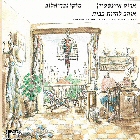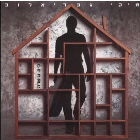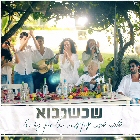When We Come |
Shekshenavo |
שכשנבוא | |||||||
| |||||||||
|
| |||||||||
| Time will erase the years | Ha-zman ’èt ha-shanim yanis |
הַזְּמַן אֶת הַשָּׁנִים יָנִיס | |||||||
| And some wisdom in the heart will put. | U-qtsat bina ba-lév makhnis. |
.וּקְצַת בִּינָה בַּלֵּב מַכְנִיס | |||||||
| But there are things it's yet to tell me. | ’Aval yeshnam dvarim shèhu `od lo gila li. |
.אֲבָל יֶשְׁנָם דְבָרִים שֶׁהוּא עוֹד לֹא גִּילָה לִי | |||||||
| Will another lily bloom for me? | Ha’im yifraẖ li `od shoshan? |
?הַאִם יִפְרַח לִי עוֹד שׁוֹשָׁן | |||||||
| Will an ancient spark awaken in me? | Ha’im ne`or bi nitsots noshan? |
?הַאִם נַעוֹר בִּי נִיצוֹץ נוֹשָׁן | |||||||
| Is there at the end of the road an answer waiting for me? | ha’im be-sof ha-dèrèkh meẖaka tshuva li? |
?הַאִם בְּסוֹף הַדֶּֽרֶךְ מְהַכָּה תְּשׁוּבָה לִי | |||||||
| And how will we know | Ve-’ékh néda` |
וְאֵיךְ נֵדַע | |||||||
| If there is hope | ’Im yésh tiqva |
אִם יֵשׁ תִּקְוָה | |||||||
| That when we come, when we come, | Shèkshènavo, shèkshènavo, |
,שֶׁכְּשֶׁנַבוֹא, שֶׁכְּשֶׁנַבוֹא | |||||||
| We'll find an answer? | Nimtsa tshuva? |
?נִמְצָא תְּשׁוּבָה | |||||||
| Where does the track lead? | Le’an nimshèkhèt ha-msila? |
?לְאָן נִמְשֶֽׁכֶת הַמְּסִלָּה | |||||||
| Where does the prayer go? | le’an holèkhèt ha-tefila? |
?לְאָן הוֹלֶֽכֶת הַתְּפִלָּה | |||||||
| And who will answer the question and who will hear me? | U-mi yashiv la-she’éla u-mi yishma` li? |
?וּמִי יָשִׁיב לַשְּׁאֵלָה וּמִי יִשְׁמַע לִי | |||||||
| And who will open their heart to me? | U-mi yiftaẖ li levavo? |
?וּמִי יִפְתַּח לִי לְבָבוֹ | |||||||
| And if I'll go, where will I arrive? | Ve-’im ’élékh le’an ’avo? |
?וְאִם אֵלֵךְ לְאָן אָבוֹא | |||||||
| Is there at the end of the road an answer waiting for me? | ha’im be-sof ha-dèrèkh meẖaka tshuva li? |
?הַאִם בְּסוֹף הַדֶּֽרֶךְ מְהַכָּה תְּשׁוּבָה לִי | |||||||
| It's just me and just you, | Zè rak ’ani ve-zo rak ’at, |
,זֶה רַק אֲנִי וְזוֹ רַק אַתְּ | |||||||
| And that's a lot and that's so little. | Ve-zè harbé ve-zè ko me`at. |
.וְזֶה הַרבֵּה וְזֶה כֹּה מְעַט | |||||||
| And how will we know if our lives have not been in vain? | Ve-’ékh néda` ’im lo larik `avru ẖayénu? |
?וְאֵיךְ נֵדַע אִם לֹא לָרִיק עַבְרוּ חַיֵֽינוּ | |||||||
| Has our labor been in vain? | Ha’im `amalnu lo lashav? |
?הַאִם עֲמָלְנוּ לֹא לַשָּׁוְא | |||||||
| Will our home not be destroyed? | Ha’im béyténu lo yiẖrav? |
?הַאִם בֵּיתֵֽינוּ לֹא יִחְרַב | |||||||
| Will love survive even after us? | Ha’im tiẖyè ha-’ahava gam aẖarénu? |
?הַאִם תִּחְיֶה אַהֲבָה גַם אַהֲרֵֽינוּ | |||||||
|
Lyrics in Hebrew: Eli Mohar, music: Argyris Kounadis. The melody is that of a Greek song, "Τι θέλεις γέρο;" [What do you want, old man?] | |||||||||


